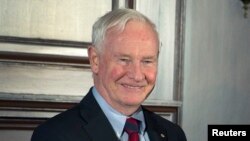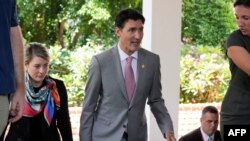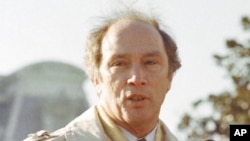Canadians are almost evenly divided on whether Prime Minister Justin Trudeau’s government is sincere about probing an alleged Chinese scheme to ensure Trudeau’s re-election in 2019 and 2021 while taking care to make sure his government remained hobbled with a minority in Parliament.
Some 52% of respondents said a preliminary investigation of the allegations by former Governor General David Johnston was sincere, while 48% thought it was a cover-up, according to an Ipsos poll released this week by Global News, a Canadian outlet.
Johnston has been tasked with deciding by May 23 whether there is sufficient evidence to warrant a public inquiry into the allegations, which are based on a leak from a member of Canada’s intelligence community and first appeared February 17 in Toronto's Globe and Mail, the nation’s leading newspaper.
According to that and subsequent Globe and Mail reports, persons working on behalf of China engaged in under-the-radar smear campaigns during the two elections against candidates seen as unfavorable to China. The campaigns were aimed at the Chinese Canadian diaspora, who make up a majority in some electoral districts in and around Vancouver and Toronto, and targeted mainly members of the opposition Conservative Party.
The leaks indicated that Chinese operatives worked at the same time to enhance the prospects of candidates seen as more favorable to China, including by staffing campaigns with volunteers with connections to Chinese representatives.
Vancouver-based commentator Ronald Leung has pointed out that some recent immigrants from China who have gained Canadian citizenship still draw pensions from their former jobs in China, leaving them susceptible to pressure from Chinese government representatives.
The Canadian Security and Intelligence Service reportedly concluded that the Chinese interference did not alter the outcome of either election, but at least a few of the losing candidates believe the Chinese activity contributed to their personal defeats.
Among the targeted Conservative Party candidates were Kennedy Stewart, a former mayor of Vancouver, and Kenny Chiu, who was elected to parliament in 2019 from a district close to Vancouver.
Stewart had supported Vancouver’s forming a sister city relationship with Kaohsiung, a southern city in Taiwan, while Chiu has been outspoken about Beijing’s human rights abuses in his native Hong Kong and against the Uyghur community in northwest China.
Chiu’s loss was celebrated by China’s top diplomat in Western Canada, according to one of the leaks. Tong Xiaoling, China’s then-consul general in Vancouver, reportedly gushed over the event, saying that Chiu’s loss proved that the “strategy and tactics [employed by those tasked with unseating him] were good, and contributed to achieving their goals while still adhering to the local political customs in a clever way.”
Tong was also reported to have been enthusiastic about grooming members of the Chinese Canadian community to run for public office, beginning with municipal posts but aiming for higher offices later.
China has rejected the allegations. The Chinese Consulate in Vancouver issued a statement on March 16 saying its officials had every right to engage in contacts with members of society, while reiterating a routine talking point that China never had, nor does it possess, any interest in interfering in another country’s domestic politics. It accused those politicians and media reports saying otherwise of waging a smear campaign.
The appointment of Johnston, the former governor general, to conduct the initial assessment of the matter is in itself controversial. According to The Globe and Mail, he was on the board of a foundation named for Trudeau’s father, former Prime Minister Pierre Trudeau, which received and recently returned $140,000 in donations from a donor with potential links to the Chinese government.
While Johnston ponders the evidence and decides how to proceed, the scandal has already forced one provincial and one federal legislator to resign from their respective parties.
Vincent Ke, a member of the Ontario legislature, stepped down from the Conservative Party caucus in early March following a media report by Global News that he had received around $50,000 from the Chinese Consulate in Toronto that was channeled through a series of intermediaries. Ke has denied the claim.
And in late March, Toronto-area MP Han Dong resigned from Trudeau’s Liberal Party caucus following a Global News report that he had advised a Chinese diplomat that China should postpone the release of two Canadians held there until after the 2021 election for fear that the Conservatives would benefit.
The nation’s media, meanwhile, have seized on the issue with almost daily reports analyzing the impact of the scandal on relations with China and on the nation’s Chinese Canadian community itself.
“I think it’s a wake-up call for Canadians,” Aaron Shull, managing director at Ontario's Center for International Governance Innovation, said in a phone interview. “You cannot pick up a newspaper in Canada right now or listen to the radio without there being a story front and center on this issue.”
Shull said the charge of Chinese political interference “goes right to the core fabric of who we are as Canadians, which is premised on democracy and the rule of law, that we get to choose how to govern ourselves.” To have a foreign government try to intervene in that process is deeply offensive, he said. “There’s a visceral reaction to that.”
Asked why China would care who runs Canada, Shull attributed Beijing’s reported actions to a desire to “bend the world around them into a manner that befits their geostrategic interests.”
Michel Juneau-Katsuya, a former Asia Pacific chief at the Canadian intelligence service, warned that China’s political interference constitutes “a phenomenal security risk for the Canadians.”
“Because basically you can ask yourself the question: Who’s really running the country? Is it a foreign entity or is it our government? This is the problem we’re currently facing,” Juneau-Katsuya said in an interview with the Canadian Broadcasting Corporation.
Among the responses being proposed in Canadian media and by some politicians is the establishment of a foreign agent registration act similar to a long-standing law in the United States requiring anyone lobbying on behalf of a foreign government to register and make certain disclosures.
That suggestion has been challenged on the ground that it would encourage discrimination against Chinese Canadians. But that argument rings hollow for David Mulroney, who served as Canada’s ambassador to China from 2009 to 2012.
“Setting up a registry of foreign agents is in no way racist,” Mulroney said in an op-ed for The Globe and Mail. "But assuming it would contain only Chinese names is.”
Mulroney maintained in an email exchange with VOA that the Chinese Communist Party “uses money, free travel and other perks to conduct what’s called ‘elite capture,’ recruiting prominent Canadians, regardless of their ethnicity, to deliver its talking points and conduct its lobbying.”







